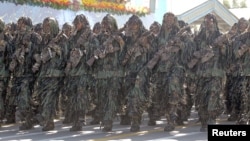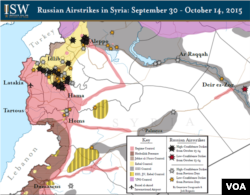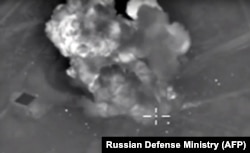The Pentagon said Thursday that an airdrop of ammunition and equipment last Sunday was successfully delivered to Syrian Arab forces.
The supplies were intended for Sunni Arab brigades in northeastern Syria that have been fighting Islamic State in an area north of the IS stronghold in Raqqa.
A Pentagon official said the U.S. military was confident that the ammunition got to the Syrian Arab coalition.
Earlier, Pentagon spokesman Peter Cook told reporters that some of the airdrop might have ended up with other groups, including Kurdish forces. Defense officials later issued a correction, saying it had no indication "any of that equipment was shared with any other groups."
The French news agency AFP quoted a U.S. defense official who said that the U.S. military was now poised to build on its successful airdrop and deliver weaponry to Syrian rebels "if they can demonstrate they have used it in an effective way against [Islamic State]."
Iranian buildup
Meanwhile, Iran is intensifying its presence in Syria, sending hundreds of elite troops into the country in support of the regime of embattled President Bashar al-Assad.
Tehran dispatched the troops into northern and central Syria, where they joined fighters from Iran's Lebanese ally, Hezbollah, to take advantage of an extensive Russian aerial bombardment against rebels fighting Syrian forces. Russia said Thursday that it had launched 33 new sorties in Syria, the latest strikes in its two-week-old air campaign.
Regional officials said Iran could deploy as many as 2,000 troops from its Iranian Revolutionary Guards to Syria.
Iran has backed the Assad government from the start of the 4½-year conflict. It began sending fighters to Syria two weeks ago, after Russian airstrikes began, and has now increased the flow. This week, Iran's Quds force commander, General Qassem Suleimani, was pictured addressing fighters in the Latakia area.
Russia: IS 'retreat'
Russia’s Defense Ministry claimed Thursday that Islamic State forces in Syria had begun “retreating” to new positions.
Spokesman Major General Igor Konashenkov said Russian intelligence was analyzing data about IS movements, using both information it had collected by manned aircraft and unmanned aerial vehicles and information provided by “the information center in Baghdad.”
Late last month, Russia announced it had reached an agreement with Iraq and Syria to create a joint information center in Baghdad to coordinate operations against Islamic State militants.
Russia carried out its Thursday airstrikes to provide cover for an offensive by Syrian government troops in the central province of Homs, according to Syrian state television and activists.
State television said Syrian troops captured the town of Khaldiyeh near the main city of Hama and killed several militants near the city of Homs.
Russian warplanes launched at least 15 airstrikes on the rebel-controlled town of Talbisseh, killing at least 10 people, six of whom were rebels, according to the Britain-based Syrian Observatory for Human Rights.
Criticism from Putin
Russian President Vladimir Putin denounced the U.S. stance on the Syrian conflict as "unconstructive" after Washington declined to take part in high-level, bilateral negotiations on coordinating military activity in Syria.
Moscow has said Washington refused its offer to discuss further military cooperation in the war-torn country. The U.S. has strongly criticized Russia's military campaign in Syria, saying it has been aimed at rebels fighting Syrian troops instead of the IS insurgents the U.S. is targeting.
"I have a hard time understanding how our American partners can criticize Russia's actions in Syria in the struggle against international terrorism if they refuse to have a direct dialogue on such important issues as political settlement," Putin said on a visit Thursday to Kazakhstan. "I consider this position to be unconstructive. The absence of any agenda on this issue is apparently the reason for the weakness of the American position."
A U.S. State Department spokesman Wednesday said he did "not have anything specific" on the proposal for higher-level talks. John Kirby also said the U.S. continued to show a willingness to talk with Russian authorities.
The U.N. envoy for Syria, Staffan de Mistura, is pushing a separate effort to get the U.S. and Russia working toward a broad political resolution to the crisis in Syria.













